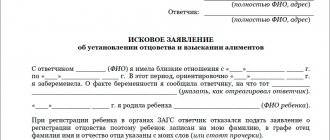More and more often, men in Russia complain: “My wife has filed for alimony.” Situations like this are no longer as rare as they used to be. In modern Russia, women quite often face situations in which the stronger half of society refuses to fulfill their male responsibilities. We are talking about providing for the family and the child. Because of this, disputes constantly arise. What do you need to know about alimony obligations in Russia? Who, when and under what circumstances has the right to them? Is it possible not to pay the prescribed amounts? It will not be difficult to answer all this. It is enough to thoroughly study the basics of Russian legislation.
Concept of alimony
The first step is to understand what we are talking about. What is called alimony in Russia?
This concept usually means funds paid at a certain frequency (usually monthly) in established amounts. Money is spent on the maintenance of this or that citizen.
Today in Russia you can face alimony payments:
- on children (the most common situation);
- for a spouse (usually a wife);
- on parents.
Has a citizen's wife filed for alimony? Does she even have the right to do this? It is difficult to answer the question posed. It all depends on the specific situation. Next, different options for the development of events will be considered.
Common-law wife
Let's start with the simplest cases. For example, when a common-law wife filed for alimony. What can she count on?
In Russia, only official husbands and wives can receive guarantees of maintenance from former and current spouses. This means that a civil marriage does not give the girl any rights. But there are exceptions.
Which ones exactly? If we are talking about child support for common children. Even if they were born out of wedlock, the mother can go to court to order child support. To do this, you will have to prove paternity.
Accordingly, in this case, the common-law husband will only pay for the maintenance of common minors. But he is in no way responsible for the life of his former common-law wife. No need to worry. The exception is cases in which the girl is on maternity leave due to caring for a common baby. Then, until the child is 3 years old, both the child and his mother will have to be fully supported. Even if she was a common-law spouse.
Alimony for a pregnant or maternity spouse
Despite the restrictions on a man’s rights to divorce during his wife’s pregnancy and the first year after the birth of a child, specified in Art. 17 of the RF IC, the spouse often still agrees to end the marriage and no longer wants to maintain a rapidly collapsing relationship that exhausts her morally and physically.
As for pregnancy, in this case a woman does not need to prove anything at all to receive alimony for her maintenance from her spouse. A certificate from the clinic confirming this fact is sufficient. This rule applies regardless of whether the marriage is valid or dissolved at the time of application. What is important is simply the presence of a pregnancy with a common child.
A similar rule applies to a mother raising a child until he is 3 years old. While on maternity leave, a woman is physically unable to work and support herself, so this responsibility falls on her husband. It doesn’t matter whether the child was born in marriage or after the parents separated. The main thing is that this happens no later than 300 days after the official divorce of the spouses. If a man doubts that the child is his, he can establish paternity in court. If the examination confirms doubts and infidelity of the other half, alimony for the wife will not have to be paid. No one can oblige a person to support a child and his mother who is not his own, even if the spouses were married at the time of pregnancy.
According to changes in legislation (at the moment), maternity leave can be extended until the child turns 4.5 years old. But this does not mean that the husband will have to pay spousal support until this age. The legislator clearly provides for a period of 3 years. And 4.5 years is the maximum period that can be included in the length of service.
Alas, payments for pregnancy and childbirth, as well as for maternity leave, cannot always provide a decent standard of living even for the child, not to mention the mother herself. In such cases, the law, namely paragraph 1 of Article 90 of the RF IC, provides additional ways to protect the rights of a young mother and baby, entrusting the father of the child with maintaining not only the minor, but also his mother for three years from the date of birth of the joint child.
When should you pay alimony to your wife on maternity leave?
Unlike the father's alimony obligations to the child, the husband is obligated to support his wife on maternity leave only if she needs financial support.
The law, unfortunately, does not establish fixed values of need. Leaving the resolution of this issue entirely within the competence of the court. It is the court that will decide whether the mother of the child is entitled to financial assistance from her spouse and, if so, what its amount will be. Minimum or maximum values, as, for example, in the case of payments to parents for children, are not established by the Code in relation to a spouse. The collection of alimony is also allowed in marriage if the wife proves that her legal spouse does not provide her with sufficient funds for living.
To establish alimony in favor of a wife on maternity leave, the spouse (or ex-wife) must apply to the court with a corresponding application, which indicates:
- Name of the court, as well as addresses and details of the parties: her and her former spouse;
- Description of the situation - when the marriage was concluded, when it was dissolved, whether support is provided to her;
- Justification of need with the attachment of all necessary documents (certificate on the amount of maternity benefits; treatment costs, etc.);
- A request to the court indicating the amount of alimony to be collected;
- Applications, date and signature with transcript.
The application must be submitted to the magistrate's court at the place of residence of the defendant and will be considered in a lawsuit. Filing an application by way of writ proceedings is unacceptable, since during the proceedings it will be necessary to determine the degree of need and decide on the amount in which alimony will be paid to the wife on maternity leave for three years. In this case, monetary maintenance for the spouse is paid in parallel with alimony after a divorce for the child, and these two obligations in no way affect the determination of the amount of maintenance in relation to each of the recipients.
What is the amount of alimony for a wife on maternity leave?
The main criterion when determining the amount of payments for a spouse is her real need and financial situation. Examples of needs for assistance include:
- “maternity” payments are less than the minimum subsistence level or are absent altogether;
- the need for expensive treatment;
- lack of additional sources of income;
- the presence of one or more dependent children from another marriage, for whom alimony is either not paid or is paid irregularly.
Having established that the spouse really needs measures of additional financial assistance, the court collects alimony from the ex-spouse, determining its amount either in a fixed amount or in relation to the cost of living in the region.
Note: If over time the financial situation of the ex-wife changes or she marries again, her ex-husband has the right to demand the cancellation of the established alimony for his wife on maternity leave. But no one will free him from child support only for his wife.
Alimony for wives during marriage
“My wife filed for alimony. We live together. What to do?" — questions of this kind are often asked to modern lawyers. Unfortunately, filing for alimony in marriage in Russia is becoming more and more common. This is the legal right of spouses.
Please note that wives have the right to claim full marital maintenance under the following circumstances:
- providing care for children until they reach 3 years of age;
- caring for a common disabled child who is under 18 years of age (proven need);
- during pregnancy;
- caring for a general disabled child of group 1 (regardless of age).
But that is not all. Any official wife can think about how to apply for alimony during marriage. Especially if she cares for and raises common children. For example, by agreement with my husband.
Alimony to wife after divorce
After a divorce, the wife also has the right to receive financial assistance from her husband. In addition to the grounds listed above for receiving this assistance, the law provides several more grounds:
- The wife became disabled (disabled group I or II) while still married or within 1 year after the divorce and needs financial assistance.
- The wife reached retirement age no later than 5 years after the divorce, if the spouses have been married for a long time. At the same time, the wife was recognized as needy.
Alimony to the wife of a disabled person. Payment terms
In some of the circumstances listed above, which give the wife the right to alimony from her husband, there is a condition - need. Neediness is a financial situation in which income (both earnings and government benefits) is not enough to cover basic life needs. In each specific case, the court determines the degree of need based on life circumstances.
Disability, as one of the conditions that gives a wife the right to alimony from her husband, is a health condition in which the wife is unable to work and earn an income. As a rule, we are talking about disability of group I or II.
The right to alimony arises when these conditions are combined - incapacity and need . It must be said that disability and neediness are not always interconnected. For example, a disabled wife may be the owner of her own business and have an income that fully covers her needs. Or, conversely, a healthy woman may need financial assistance, having every opportunity to independently provide for her needs. In these cases, the wife has no right to alimony.
Note! Proving need and incapacity for work is only necessary if the wife is disabled! Alimony for a wife on maternity leave and during pregnancy, while caring for a common disabled child under 18 years of age and a disabled child from childhood is paid regardless of need and disability.
How much alimony will a disabled wife receive from her husband?
If the spouses cannot themselves determine the amount of alimony acceptable to both, the issue of the amount of alimony will be decided by the court.
The law does not establish either a minimum or maximum limit for the monthly allowance for a disabled wife from her husband. The decisive factor in this case will be the very neediness and incapacity for work, which must be proven in court. The court will analyze the health, financial situation, family circumstances of the woman and man, and then set a fixed amount of alimony payment. As a rule, the court focuses on the cost of living in the woman’s region of residence.
Neediness
Can a wife apply for alimony if a marriage is registered between a man and a woman? Yes, this is quite normal. The husband can also, under certain circumstances, demand maintenance from his wife. Only in practice does the court in Russia side with the weaker half of society.
The main criterion for determining the payment of alimony is the need of the spouses. In addition to the cases already listed, the following situations can be identified in which you can demand money for maintenance:
- the former spouse became disabled before the termination of the officially registered relationship;
- the husband/wife's incapacity for work occurred within a year from the date of divorce;
- a citizen who has been married for a long time has retired (if this happened no later than 5 years from the official breakup).
As a rule, if a wife has filed for alimony, the husband begins to think about ways to evade such obligations. Are there cases in which money for maintaining a spouse is not collected?
Amount of alimony
Alimony for the maintenance of a former spouse in need of help must be determined by the court in a fixed amount. The maximum amount of alimony cannot be more than 50% of the income of the person obligated to pay alimony. When calculating, all types of earnings of the defendant must be taken into account:
- basic salary,
- additional income,
- royalties,
- received inherited property,
- winnings,
- dividends,
- alimony and debt obligations.
When alimony is not awarded
Yes. As already mentioned, the current restrictions apply to both men and women. That is, spouses in an official marriage have the same rights. But in practice, it is women who are given more freedom. This is a normal experience in modern Russia.
Alimony for maintaining a wife during marriage (and after it) is not paid if:
- the spouse's incapacity for work occurred as a result of her behavior;
- for a short marriage (up to 1 year inclusive);
- the potential recipient of alimony behaved inappropriately (violated legal and moral standards of behavior, committed a crime against the alimony payer).
The topic being studied does not have any other features. Issues related to alimony are almost always resolved in court. It is almost impossible to reach a peaceful agreement. Especially if the wife filed for alimony without a divorce.
About alimentary obligations
To begin with, we will turn to Article 89 of the Family Code of the Russian Federation, which provides clarification and clearly states that spouses bear equal responsibility and are obliged to help each other. If such support does not come voluntarily, then the other party may demand alimony for its maintenance by contacting the judicial authorities.
What is the basis for forced collection of funds?
- one of the spouses is declared incompetent. Circumstances may vary. This may be reaching retirement age or having a disabled spouse;
- the wife is pregnant or is caring for a child under 3 years old;
- one of the spouses caring for a common child who has not reached the age of majority and is disabled. At this point it can already be seen that there are no reservations regarding who provides care. Is it dad or mom?
You can collect alimony for maintenance only if the parties were or are officially married! The concept of “civil marriage” has no legal force in this situation and cannot be the basis for recovery.
Pregnancy and child support
As already stated, a pregnant woman has the right to full maintenance from her spouse. The presence of a marriage does not affect this feature. The main thing is that the girl bears a common baby.
A woman has the right to go to court for alimony if the child is born no later than 300 days after the termination of the relationship. In this case, the ex-spouse is the presumptive father of the newborn. Such a decision can be appealed in court.
By law, all pregnant wives can turn to their husbands for financial support. The Family Code of the Russian Federation indicates that the “interesting position” of a spouse is the basis for her full maintenance. To collect funds, a certificate of pregnancy is sufficient.
Has your wife filed for alimony? If she is in an “interesting” situation, the court will examine the spouse’s solvency and then order payments for the woman’s maintenance. In some cases, it is possible to agree on specific payments.
Amount of alimony compensation
While the Family Code of the Russian Federation clearly states how much alimony minor children should receive from the parent’s income, no specific amounts have been approved regarding cash benefits for spouses. The second part of Article 90, which talks about the right of former spouses to collect alimony payments, states that they can determine the amount of compensation and the procedure for this procedure at their own discretion. However, if individuals nevertheless come to a common point of view, then it must be transferred to the notarial agreement.
And the next article (91) shows how the amount of alimony benefits is determined if the future recipient tries to recover them from the payer through legal proceedings. This legislative act must be followed by all individuals who were unable to formalize an alimony agreement. The main provisions are:
- The court decides what the amount of payments will be. Many individuals who have been unable to conclude a peace agreement with their husband/wife file a lawsuit in order to forcibly recover payments and mistakenly believe that the amount will be assigned to the one prescribed by the applicant. However, it is not. The judge will decide how much money to withhold from the payer.
- Family circumstances and financial situation affect the amount of payments. In order to fairly approve a particular amount that will be regularly withdrawn from the earnings of one spouse and transferred to the bank account of the other, the judge analyzes the income level of both individuals, as well as their marital status. For example, if a potential payer has alimony obligations with some other relatives, and the amount of his earnings, taking into account all payments, is small, then the allowance for the spouse will be assigned in the minimum amount.
- Alimony is provided in a fixed amount of money. If we are talking about compensation for spousal support, then there is only one option regarding the form in which it should be accrued - in the form of a fixed sum of money. In other words, the court order displays a certain amount of alimony, and this fixed amount will be transferred to the recipient every month.
If the level of the cost of living in the region in which the spouse who is the recipient of alimony lives increases significantly, then the amount of the benefit should also change upward, taking into account the indexation rules.
Decree
Can a wife apply for alimony while still in an official relationship? Yes. Especially if she is on maternity leave due to caring for common children. This is a fairly common occurrence.
In this case, alimony for the maintenance of the wife during marriage will be calculated taking into account the financial situation of each spouse. The legislation of the Russian Federation does not have any clear guidelines regarding how much money can be required when caring for a child. Usually the exact amount is tied to the cost of living in a particular region.
Grounds, conditions and goals
Unfortunately, cases when families with children break up, and the mother is left alone with the baby in her arms, are very common. Many men think that by terminating their marriage, they relieve themselves of all obligations, but this is not so. Parents are obliged to financially support their minor children , as stated in Art. 80 of the Family Code of the Russian Federation (RF IC). And it does not matter whether an official marriage is concluded between the father and the mother or not, including its official dissolution.
Spouses can independently agree on payments among themselves by signing an agreement in accordance with Chapter 16 of the RF IC (you can learn how to correctly draw up such an agreement here). If one of the parents refuses to take part in the child’s life or provide financial assistance, then the second parent has the right to arrange child support in court.
In addition, the legislation provides for cases when a wife can also collect alimony from her husband. The responsibilities of spouses for mutual maintenance are prescribed in Art. 89 RF IC.
IMPORTANT! If a man and woman were in a civil marriage and had children, then the mother can demand child support only for the child. The law provides for payments to the wife if the marriage has been formalized.
A woman can go to court to recover alimony payments for herself and the child in the following cases:
- the marriage relationship has been officially registered or dissolved;
- the wife is pregnant, or is on maternity leave to care for a child who is not yet 3 years old;
- a woman is raising a joint child of a disabled person who has not reached the age of majority and needs financial assistance;
- the spouse takes care of a child with a childhood disability of groups 1-2, even if he is already 18 years old, but she needs financial support.
The above grounds give the wife the right to demand alimony from her husband for herself and the child, both during marriage and after its dissolution. In addition, after a divorce, a woman also has the right to apply for the recovery of financial assistance in her favor if she became disabled during the marriage, or within a year after the divorce (Article 90 of the RF IC).
We talked about the nuances and grounds for collecting alimony for the maintenance of yourself and a child here, and from this article you will learn when and how you can demand maintenance from your ex-spouse for yourself and a child, including an adult.
Ex-wives
Can an ex-wife apply for alimony for her maintenance? The answer is simple - yes, but only under certain circumstances. What is it about?
In addition to all the previously mentioned features, a wife has the right to financial support from her ex-husband if:
- a woman received group 1 or 2 disability during marriage or no later than a year after its dissolution;
- The plaintiff retired no later than 5 years after the divorce, but before that the spouses lived together for a long time.
As has already been emphasized, in such circumstances the criterion of need is taken into account. If the former spouse is not recognized as a person who is in a difficult financial situation, there is no need to pay for her maintenance.
How much should your ex-husband pay?
Unlike child support, ex-wife alimony is a fixed amount calculated in court. When calculating, we start from:
- subsistence level - regional or national average; if it changes in the future, automatic recalculation occurs;
- the woman’s financial situation – the need for care, expensive medications or treatment, living conditions (not everyone can afford utility bills);
- financial status of the ex-husband - income, obligations to other persons (alimony for children, parents, dependents), stability of income (works in one place or does odd jobs).
Taking into account all the circumstances, the court assigns an amount feasible for the plaintiff, after payment of which he will be left with his own security.
New marriage
But that's not all. Did your ex-wife file for alimony? It is important to take into account the fact that such a right, when a citizen is recognized as in need of material support, will not always be preserved.
There is no need to worry if a woman takes up her personal life. Entering into a new marriage relieves the former spouse of the responsibility for maintaining his wife. This responsibility passes in full to the woman’s new husband. Therefore, there is no need to worry if the ex-wife, who has officially entered into a new marriage, decides to apply for alimony for herself.
Maintenance of a wife and a child under 3 years old
The most common reason why women turn to their ex for child support is because they have a small child. He requires constant care, which does not allow his mother to get a decently paid job. Child support does not affect the decision to pay alimony to the wife, but may somewhat limit the amount of the benefit. Men have virtually no chance of avoiding this type of payment if the woman is a normal mother who takes good care of her child.
Only the remarriage of the plaintiff relieves the former spouse of the obligation to support the mother of his child.
If there are doubts about paternity, they file a lawsuit to establish it; confirmation of suspicions will be the reason for stopping payments to both the ex-wife and someone else’s kinder.
Lack of work
Life is unpredictable. Therefore, we often have to deal with non-standard situations. “My wife filed for alimony, and I am unemployed. What should I do?" - Questions of this type are not so rare. In addition, you may encounter unofficial employment with your spouse. What can a woman count on in this case?
Has your current or ex-wife filed for alimony? What to do? It is enough to prove the fact of the absence of official income. A woman can claim her maintenance only when the man has the opportunity to pay. This means that the lack of official work is grounds for exemption from alimony. But not in all cases.
In practice, even under such circumstances, you can demand money from your spouse. Achieving justice is difficult, but possible. The wife will have to prove her husband’s unofficial earnings or his solvency. Only then will she have the right to receive money “for herself.”
The concept of need
One of the key concepts when collecting funds for a woman and/or child will be need. It is this that the court focuses on when determining whether to satisfy the plaintiff’s demands or not, as well as to what extent: in whole or in part.
There is no definition of need in the law. From experience we can say that basic needs are usually taken into account and whether the woman is able to satisfy them herself or not. That is, the court will take into account expenses for food, utilities, transportation costs, medicines, baby food, etc. But entertainment or the purchase of luxury goods are no longer considered necessary expenses.
But medical expenses are different. Let’s say a woman could take advantage of free insurance services, but preferred to go to a private clinic. In this case, it will be considered her personal choice.
When assessing need, income, existing property, and the ability to save are taken into account. For example, a woman on maternity leave is entitled to certain payments from the state. And if she has several apartments, she may be denied alimony for herself, since she is able to sell one of them or rent it out, thus solving her financial problems. The court also takes into account benefits for utilities, that is, everything that a woman is entitled to by law.
The listed factors are not always taken into account. Often they need to be emphasized separately. But for experienced family law lawyers this is not a problem. And we have former federal judges working on our staff, so there is no doubt about their qualifications.
Decor
How to apply for alimony during marriage? What does that require? If you cannot reach an agreement with your spouse peacefully, you will have to go to court. District judges decide such disputes.
When submitting documents for alimony, you need to prepare:
- lawsuit;
- applicant's passport;
- marriage/divorce certificate;
- birth certificates of all children;
- pregnancy certificate (if available);
- documents confirming the income of the parties;
- statements indicating the husband’s earnings and deductions from his salary;
- pensioner's ID;
- health certificates (of the plaintiff, children);
- statements indicating that the child is a dependent.
Usually this list is enough. Any documents that can confirm the fact that a woman needs financial support from her husband can be added to the listed papers.
In what cases do you apply for child support without a divorce?
The RF IC guards the interests of children and even takes into account the case when the legal father does not allocate the necessary funds for the maintenance of the common offspring.
This happens in different situations, for example, when a marriage was concluded, there was no divorce, but in fact the spouses live separately and they do not have a common budget. Or they live in the same living space, but the spouse does not allocate money for the child . Such cases force people who are legally married to go to court.
A woman who is married can receive child support through the court in the following cases:
- the family has minor children (common);
- there are disabled common children (disabled or sick with an incurable disease) regardless of their age.
All issues regarding the receipt of alimony in Russia, including for married persons, are regulated by the RF IC and the Code of Civil Procedure of the Russian Federation.
Children and child support
The situation is a little different if the wife has filed for child support. By law, both parents are required to support their minor children. Therefore, the mother, even if she is the defendant’s ex-wife, has every right to receive child support. The exception is when minors live with their father. In Russia such cases are extremely rare.
How much will you have to pay? You may encounter fixed alimony payments. Then the amount of payments will not be tied to salary. The court itself will decide how much money the father will have to pay for this or that minor.
Most often, women file for alimony as a percentage of their earnings. In this case, according to the law, you can calculate:
- 25% of the husband’s income - for 1 child;
- 33% of monthly earnings - for 2 children;
- 50% of income - for 3 or more children.
Another nuance is that parents’ lack of work does not relieve them of responsibility. This means that even if the father is not officially employed, he will be required to pay child support. For a wife - no, but for minors - yes. Money will be withheld from benefits and other payments due to the citizen. If the father of the children does not have finances, the payer accumulates debt. It will have to be extinguished sooner or later.
Alimony to a spouse upon the birth of a child in another family
Many women are concerned about the issue of supporting their ex-wife if a child was born in another family. The birth of a baby does not cancel the ex-wife's right to receive alimony . But the amount she claims may decrease, since the ex-husband must support the replenishment. Only if a man files a lawsuit and proves that he is a poor fellow - a complete beggar, and has nothing to take from him, and also a child to feed, is a decision in his favor possible.
It is, of course, not fair that alimony for a wife is paid only until the child turns 3 years old. You would think that the mother of a three-year-old is able to work at full capacity! After all, children at this age get sick very often. And not all employers agree to pay sick leave.
And then, when the child goes to school, the mother needs to devote even more time to him, helping with his homework. But many women cannot afford this. After all, they have to work all day.
On the contrary, I think that alimony for a wife for up to 3 years is quite enough. Why should a man carry his ex-wife for a long time? I am divorced, I left my husband when the baby was one year old. And she went to work early and never complained. But what I don’t understand is when women, having given birth to a child, believe that their ex-husband now owes them constantly and for everything
By a court decision in 1996, the court ordered child support of 1.4 thousand rubles and 300 thousand rubles for my maintenance until the child was 3 years old. I thought that I had paid all the alimony, but it turned out that the writ of execution for my maintenance was not executed and there were no deductions. Can I resume the case for the child who will be 21 on May 7, and he got married and moved to another city and will forgive two minor summer children 89884702931
Leave a comment Cancel writing
Arbitrage practice
Has your wife filed for alimony? Such situations are occurring more and more often. It should be noted that even after a divorce, a woman (or man) can claim financial support from her ex-spouse. The main thing is to prove your need. It ends by default after entering into a new marriage.
From now on, it is clear what to do if you want to file for alimony during marriage. Regardless, families are encouraged to reach an amicable agreement. It is concluded either in court or with a notary. This way, it is possible to resolve all the features related to financial support of the ex-wife more quickly.
In practice, if a wife files for alimony, this is often due to the fact that the current husband refuses to fulfill his duties. Especially if the woman is in a vulnerable state - pregnancy, caring for common children. Therefore, most often the court sides with women. If the husband applies for alimony during marriage, with a 99% probability he will not be able to obtain payments from his wife. Only if we are talking about supporting minor children.
Alimony for the maintenance of a former spouse - wife or husband
According to Russian law, married persons are obliged to support each other. This responsibility remains with the spouses even after a divorce.
Article 90 of the Family Code gives a citizen in need of help the right to demand maintenance from his former spouse.
Voluntary support of a person who needs financial assistance can be provided by the other spouse under a marriage contract or other agreement between them. In case of evasion of such assistance, alimony from the former spouse may be collected by the court.
Results
Now it’s clear what to do if the wife filed for alimony. It is enough for a man to prove that he has no official income (for example, to quit his job) in order not to pay the woman at all. These are the rules that apply today in Russia. The wife will not be able to get a penny from her husband if he does not have money.
The situation is different with child support. In this case, you will have to pay anyway. But you can try:
- determine the place of residence of minors with their father, then the mother of the children pays child support;
- deprive the mother of parental rights - no money is paid to the woman in principle;
- limit the mother's rights as a parent - the right to alimony is lost.
There are no more options for the development of events. In the case of common-law wives, you can try to prove that the child is not from the defendant. No one is obligated to pay money to support other people's children. Otherwise, common-law wives have no real rights to financial support from their spouse. You can't demand it.











